Conference Presentations by Anika Gerfer
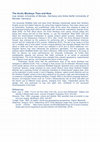
The Arctic Monkeys Then and Now
The renowned Sheffield indie rock band Arctic Monkeys intentiona... more The Arctic Monkeys Then and Now
The renowned Sheffield indie rock band Arctic Monkeys intentionally stylize their Northern English accent and dialect features. By using these regional features, they index values such as authenticity, localness, and youthfulness, while at the same time resisting to adopt an Americanized singing style which is associated with commercial ‘mainstream’ popular music (Beal 2009). On their debut album, the Arctic Monkeys even openly criticize artists who betray their values and sell out their identity, i.e. use “the handbook” (Beal 2009: 225) and follow the Americanized mainstream to quickly achieve global success. However, after performing at the Glastonbury Festival in 2013, Alex Turner, the Arctic Monkeys frontman himself, was criticized by the audience for performing with a “weirdenheimer American accent” and for “acting like a 50’s crooner” (Wakeman 2013). The aim of our study is to find out 1) whether and to what extent Turner’s singing behavior has changed between their first album in 2006 and their most recent one released in 2018 and 2) which additional, non-linguistic factors may have influenced the audience’s perception. For this purpose, we analyze salient Sheffield/ British and USA-5 (Simpson 1999) accent features in 30 songs of their six albums. As music performances are inherently multimodal, we further take extralinguistic aspects into account that might contribute to an actual or perceived transformation. The Arctic Monkeys have changed their outward appearance, experimented with different music genres, and broadened the topics of their songs.
Preliminary results show that the performance style of the Arctic Monkeys has changed on different levels. First, a change in their accent can be detected: Whereas songs of the earlier albums show an extensive Sheffield linguistic repertoire and a total absence of ‘American’ features, songs released on more recent albums show fewer Northern English features and a growing number of instances indicating an Americanized singing style, such as the realization of post-vocalic /r/ and /t/-flapping. However, salient accent features such as the Northern English variant of strut stay indexical for the band’s origin and demonstrate the co-existence of possible conflicting identities (Trudgill 1983) in the band’s language behavior. Second, non-linguistic factors such as Turner’s metamorphosis into an Elvis look-alike and the band’s use of different music genres, changing from ‘edgy’, independent genres like garage rock and post-punk to pop and glam rock, contribute to the perceived Americanization of the band.
References
Beal, Joan C. 2009. “You’re not from New York City, you’re from Rotherham”: Dialect and identity in British indie music. Journal of English Linguistics 37(3). 223-240.
Simpson, Paul. 1999. Language, culture and identity: With (another) look at accents in pop and rock singing. Multilingua 18(4). 343-367.
Trudgill, Peter. 1983. On dialect: Social and geographical perspectives. Oxford: Blackwell.
Wakeman, Gregory. 2013. Glastonbury 2013: Arctic Monkeys singer Alex Turner responds to accent criticism. https://www.inquisitr.com/822506/glastonbury-2013-arctic-monkeys-singer-alex-turner-responds-to-accent-criticism/ (23 December, 2018).
Papers by Anika Gerfer
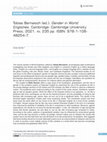
ICAME Journal
The volume Gender in World Englishes, edited by Tobias Bernaisch, encompasses eight contributions... more The volume Gender in World Englishes, edited by Tobias Bernaisch, encompasses eight contributions investigating how female and male speakers use English in numerous English as a native language (ENL), English as a second language (ESL), and English as a foreign language (EFL) varieties across the globe including, inter alia, African, Asian, and Caribbean Englishes. The individual studies do not only focus on the effect of speakers' gender on linguistic choices but also consider numerous additional linguistic and extralinguistic factors such as speaker age, speaker status, modality, and formality. Among the linguistic phenomena analyzed in this volume are the use of hedges, intensifiers, the quotative be like as well as morphosyntactic structures, for instance dative and genitive alternation. The chapter by Beke Hansen offers a case study of the localization, globalization, and the role of gender in the quotative system of Ghanaian English by examining the use of the quotative be like in the private dialogue sections of ICE-Ghana and ICE-Canada, the latter of which is used as a reference corpus. The quotatives were coded according to the content of the quote, person, time/tense, speaker age as well as speaker gender. While the effect of the linguistic factors is as expected, i.e., be like is preferred with inner monologues as well as the historical present, and the probability of using be like declines with increasing age, person does not turn out to be a significant factor. The results of the binomial logistic regression models yield some surprising results. The constraints content and time/ tense have the same effect on the choice of be like in Ghanaian English as in Inner-Circle varieties of English. Hansen argues that be like may have entered Ghanaian English in the form of a template, thus reducing the potential of variability of be like in comparison to other quotatives. Moreover, against expectations, the results do not show the female-led pattern. In fact, the interaction of age and gender shows that female speakers are less likely to use be like with increasing age compared to males. According to the author, patterns of genderlectal variation may be influenced by sociocultural gender roles, and be like may become a marker of prestige. Hansen makes sure to interpret her results with caution due to the fact that there are only 68 tokens of be like produced by 33 speakers. She suggests that future studies should turn to post-nationalist corpora such as corpora based on diasporic web forums in order to provide a more realistic picture of ESL varieties in a world which has become increasingly interconnected and globalized (Mair 2013).
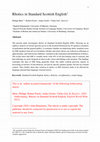
English World-Wide, 2021
The present study investigates rhotics in Standard Scottish English (SSE). Drawing on an auditory... more The present study investigates rhotics in Standard Scottish English (SSE). Drawing on an auditory analysis of formal speeches given in the Scottish Parliament by 49 speakers (members of parliament and the general public), it examines whether an underlying rhotic standard exists for SSE speakers from all over Scotland, whether and where rhotics are realized as trills/taps or approximants, and what factors influence variation in the realization and distribution of rhotics. The results show that SSE is variably rhotic with 54% of all non-linking coda /r/ realized, and that trills/taps are more frequent in intervocalic (onset and linking coda) position. The findings contradict the idea of SSE being generally rhotic but rather confirm previous reports of increasing occurrence of non-rhoticity, not just by specific speaker groups, but also in a formal context. They further show that variation in rhotics in SSE foremost tends to be affected by language-internal than language-external factors.
The present study investigates the sociolinguistics of globalisation
and performance, focusing on... more The present study investigates the sociolinguistics of globalisation
and performance, focusing on the linguistic appropriation of
Jamaican Creole (JC) by white reggae artists in reggae performances
and interviews.1 By adopting a multi-faceted approach including a
phonetic, morpho-syntactic, and lexical analysis of the singing and
speaking style of seven reggae artists and bands from the USA,
Bermuda, and Europe, this study explores the similarities and differences
between on- and offstage uses of Jamaican Creole, and
whether the singers’ access and exposure to this variety as well
as the topic of the song has an effect on their language behaviour.
The findings provide evidence for the claim that Jamaican Creole
has developed into a prestigious linguistic resource in non-Jamaican
artists’ performances of a global reggae persona, both on- and
offstage.
Languages have been spreading across the globe for many centuries. For instance, the Englishbased... more Languages have been spreading across the globe for many centuries. For instance, the Englishbased creole language Jamaican Creole (JC) has crossed national and cultural borders, not only
Drafts by Anika Gerfer
Teachers' and secondary students' language attitudes in the UK Varieties other than standard Engl... more Teachers' and secondary students' language attitudes in the UK Varieties other than standard English have long been marginalized in UK schools. Officially there are no requirements in terms of students' and teachers' accents and the national curriculum states that "RP [Received Pronunciation] has no special status in the national curriculum"
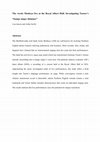
The Sheffield indie rock band Arctic Monkeys (AM) are well-known for stylizing Northern English d... more The Sheffield indie rock band Arctic Monkeys (AM) are well-known for stylizing Northern English dialect features indexing authenticity and localness. More recently, fans, media, and linguists have claimed that an Americanized singing style has crept into their performances. The band has arrived at a space pop sound which has transformed frontman Turner's former melodic storytelling into a lounge singer's vocal style. Our phonetic analysis examines AM's latest album (2020), a recording of a concert held at the Royal Albert Hall in 2018. Approaching the rarely investigated realm of live performances, this study offers a fresh insight into Turner's language performance on stage. While convergence toward a mid-Atlantic mainstream accent is detectable, salient Northern English variants remain a clear trademark and Turner further includes idiosyncrasies that create an individual singing style. The results indicate that live performances carry the potential for unique stylization.
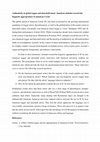
Authenticity in global reggae and dancehall music: Jamaican attitudes toward the linguistic appro... more Authenticity in global reggae and dancehall music: Jamaican attitudes toward the linguistic appropriation of Jamaican Creole The global spread of Jamaican Creole (JC) has been accelerated by the growing international popularity of reggae music, Rastafarianism, as well as the globalization of the sound system in dancehall culture. Eventually, non-Jamaican artists began to "cross" (Rampton 1995) into JC during their performances (Gerfer 2018). While crossing has already been extensively studied in the context of hip-hop music (Eberhardt & Freeman 2015), attitudes toward the use of JC by non-Jamaican reggae and dancehall artists and the question of authenticity are still understudied fields in sociolinguistic research. In the context of music performances, authenticity proves to be a highly complex concept which depends on multiple factors, such as music genre, an artist's origin and linguistic background, and audience expectations. In order to elicit Jamaicans' attitudes toward the linguistic appropriation of JC by non-Jamaican reggae and dancehall artists, interviews with Jamaican university students are conducted. The participants listen to seven sound samples (six non-Jamaican artists and one Jamaican one) which provide the basis for questionnaire-based interviews. These interviews serve to answer the following research questions: 1) Do the Jamaican participants notice that the majority of the sound samples are taken from non-Jamaican artists? Which linguistic and non-linguistic factors trigger their perception? Do they find the artists' language behavior authentic? 2) How do the Jamaican participants evaluate the use of JC by non-Jamaican artists? Preliminary results show that those artists who use a wide range of phonological, morpho-syntactic, and idiomatic expressions as well as Dread Talk (Pollard 2009) are perceived as more authentic than others. Especially songs dealing with Rastafarian topics are thought to be authentically Jamaican. Jamaican university students tend to welcome the use of JC by non-Jamaican reggae and dancehall artists. They feel the artists appreciate the language, use it successfully, and promote a positive image of Jamaica. Those who perceive it as negative state that the artists do not treat JC with respect but take advantage of it for the purpose of amusement without considering the historical context of Jamaican culture and language. References Gerfer, A. (2018). Global reggae and the appropriation of Jamaican Creole. World Englishes, 37(4), 668-683.
Thesis Chapters by Anika Gerfer
My doctoral thesis focuses on the appropriation of Jamaican Creole (JC) by non-Jamaican artists i... more My doctoral thesis focuses on the appropriation of Jamaican Creole (JC) by non-Jamaican artists in the context of reggae and dancehall music.

Uploads
Conference Presentations by Anika Gerfer
The renowned Sheffield indie rock band Arctic Monkeys intentionally stylize their Northern English accent and dialect features. By using these regional features, they index values such as authenticity, localness, and youthfulness, while at the same time resisting to adopt an Americanized singing style which is associated with commercial ‘mainstream’ popular music (Beal 2009). On their debut album, the Arctic Monkeys even openly criticize artists who betray their values and sell out their identity, i.e. use “the handbook” (Beal 2009: 225) and follow the Americanized mainstream to quickly achieve global success. However, after performing at the Glastonbury Festival in 2013, Alex Turner, the Arctic Monkeys frontman himself, was criticized by the audience for performing with a “weirdenheimer American accent” and for “acting like a 50’s crooner” (Wakeman 2013). The aim of our study is to find out 1) whether and to what extent Turner’s singing behavior has changed between their first album in 2006 and their most recent one released in 2018 and 2) which additional, non-linguistic factors may have influenced the audience’s perception. For this purpose, we analyze salient Sheffield/ British and USA-5 (Simpson 1999) accent features in 30 songs of their six albums. As music performances are inherently multimodal, we further take extralinguistic aspects into account that might contribute to an actual or perceived transformation. The Arctic Monkeys have changed their outward appearance, experimented with different music genres, and broadened the topics of their songs.
Preliminary results show that the performance style of the Arctic Monkeys has changed on different levels. First, a change in their accent can be detected: Whereas songs of the earlier albums show an extensive Sheffield linguistic repertoire and a total absence of ‘American’ features, songs released on more recent albums show fewer Northern English features and a growing number of instances indicating an Americanized singing style, such as the realization of post-vocalic /r/ and /t/-flapping. However, salient accent features such as the Northern English variant of strut stay indexical for the band’s origin and demonstrate the co-existence of possible conflicting identities (Trudgill 1983) in the band’s language behavior. Second, non-linguistic factors such as Turner’s metamorphosis into an Elvis look-alike and the band’s use of different music genres, changing from ‘edgy’, independent genres like garage rock and post-punk to pop and glam rock, contribute to the perceived Americanization of the band.
References
Beal, Joan C. 2009. “You’re not from New York City, you’re from Rotherham”: Dialect and identity in British indie music. Journal of English Linguistics 37(3). 223-240.
Simpson, Paul. 1999. Language, culture and identity: With (another) look at accents in pop and rock singing. Multilingua 18(4). 343-367.
Trudgill, Peter. 1983. On dialect: Social and geographical perspectives. Oxford: Blackwell.
Wakeman, Gregory. 2013. Glastonbury 2013: Arctic Monkeys singer Alex Turner responds to accent criticism. https://www.inquisitr.com/822506/glastonbury-2013-arctic-monkeys-singer-alex-turner-responds-to-accent-criticism/ (23 December, 2018).
Papers by Anika Gerfer
and performance, focusing on the linguistic appropriation of
Jamaican Creole (JC) by white reggae artists in reggae performances
and interviews.1 By adopting a multi-faceted approach including a
phonetic, morpho-syntactic, and lexical analysis of the singing and
speaking style of seven reggae artists and bands from the USA,
Bermuda, and Europe, this study explores the similarities and differences
between on- and offstage uses of Jamaican Creole, and
whether the singers’ access and exposure to this variety as well
as the topic of the song has an effect on their language behaviour.
The findings provide evidence for the claim that Jamaican Creole
has developed into a prestigious linguistic resource in non-Jamaican
artists’ performances of a global reggae persona, both on- and
offstage.
Drafts by Anika Gerfer
Thesis Chapters by Anika Gerfer
The renowned Sheffield indie rock band Arctic Monkeys intentionally stylize their Northern English accent and dialect features. By using these regional features, they index values such as authenticity, localness, and youthfulness, while at the same time resisting to adopt an Americanized singing style which is associated with commercial ‘mainstream’ popular music (Beal 2009). On their debut album, the Arctic Monkeys even openly criticize artists who betray their values and sell out their identity, i.e. use “the handbook” (Beal 2009: 225) and follow the Americanized mainstream to quickly achieve global success. However, after performing at the Glastonbury Festival in 2013, Alex Turner, the Arctic Monkeys frontman himself, was criticized by the audience for performing with a “weirdenheimer American accent” and for “acting like a 50’s crooner” (Wakeman 2013). The aim of our study is to find out 1) whether and to what extent Turner’s singing behavior has changed between their first album in 2006 and their most recent one released in 2018 and 2) which additional, non-linguistic factors may have influenced the audience’s perception. For this purpose, we analyze salient Sheffield/ British and USA-5 (Simpson 1999) accent features in 30 songs of their six albums. As music performances are inherently multimodal, we further take extralinguistic aspects into account that might contribute to an actual or perceived transformation. The Arctic Monkeys have changed their outward appearance, experimented with different music genres, and broadened the topics of their songs.
Preliminary results show that the performance style of the Arctic Monkeys has changed on different levels. First, a change in their accent can be detected: Whereas songs of the earlier albums show an extensive Sheffield linguistic repertoire and a total absence of ‘American’ features, songs released on more recent albums show fewer Northern English features and a growing number of instances indicating an Americanized singing style, such as the realization of post-vocalic /r/ and /t/-flapping. However, salient accent features such as the Northern English variant of strut stay indexical for the band’s origin and demonstrate the co-existence of possible conflicting identities (Trudgill 1983) in the band’s language behavior. Second, non-linguistic factors such as Turner’s metamorphosis into an Elvis look-alike and the band’s use of different music genres, changing from ‘edgy’, independent genres like garage rock and post-punk to pop and glam rock, contribute to the perceived Americanization of the band.
References
Beal, Joan C. 2009. “You’re not from New York City, you’re from Rotherham”: Dialect and identity in British indie music. Journal of English Linguistics 37(3). 223-240.
Simpson, Paul. 1999. Language, culture and identity: With (another) look at accents in pop and rock singing. Multilingua 18(4). 343-367.
Trudgill, Peter. 1983. On dialect: Social and geographical perspectives. Oxford: Blackwell.
Wakeman, Gregory. 2013. Glastonbury 2013: Arctic Monkeys singer Alex Turner responds to accent criticism. https://www.inquisitr.com/822506/glastonbury-2013-arctic-monkeys-singer-alex-turner-responds-to-accent-criticism/ (23 December, 2018).
and performance, focusing on the linguistic appropriation of
Jamaican Creole (JC) by white reggae artists in reggae performances
and interviews.1 By adopting a multi-faceted approach including a
phonetic, morpho-syntactic, and lexical analysis of the singing and
speaking style of seven reggae artists and bands from the USA,
Bermuda, and Europe, this study explores the similarities and differences
between on- and offstage uses of Jamaican Creole, and
whether the singers’ access and exposure to this variety as well
as the topic of the song has an effect on their language behaviour.
The findings provide evidence for the claim that Jamaican Creole
has developed into a prestigious linguistic resource in non-Jamaican
artists’ performances of a global reggae persona, both on- and
offstage.